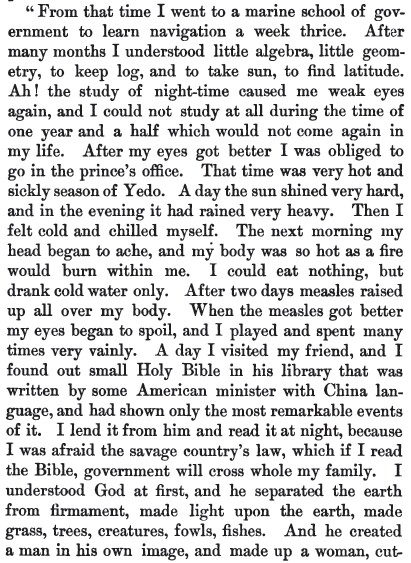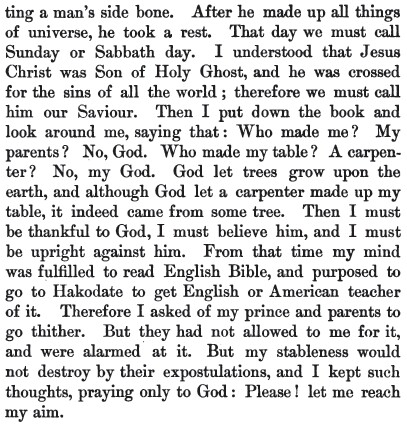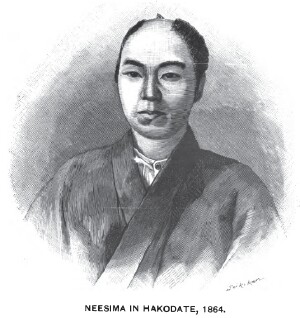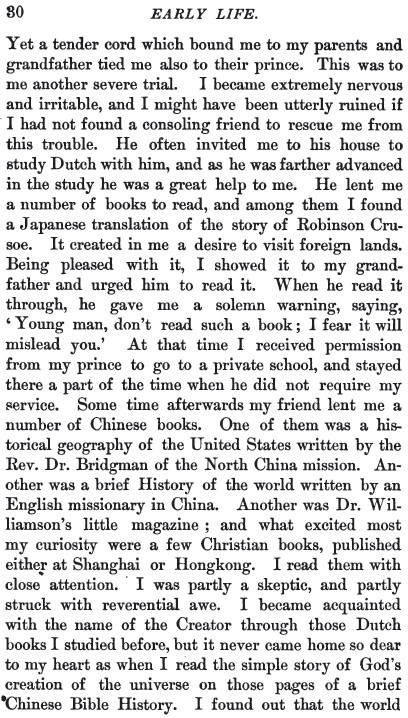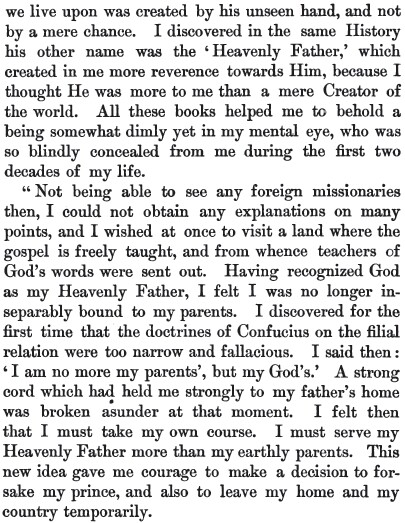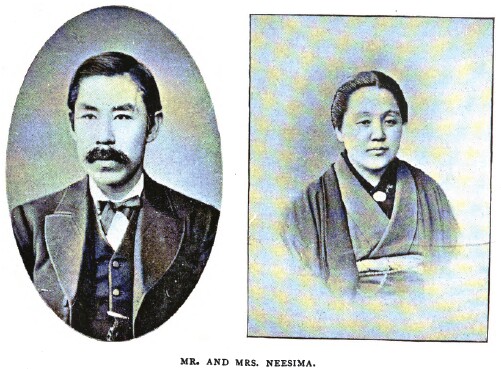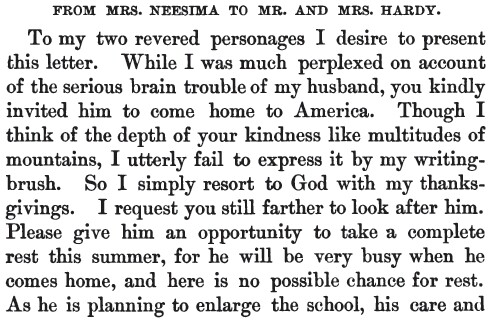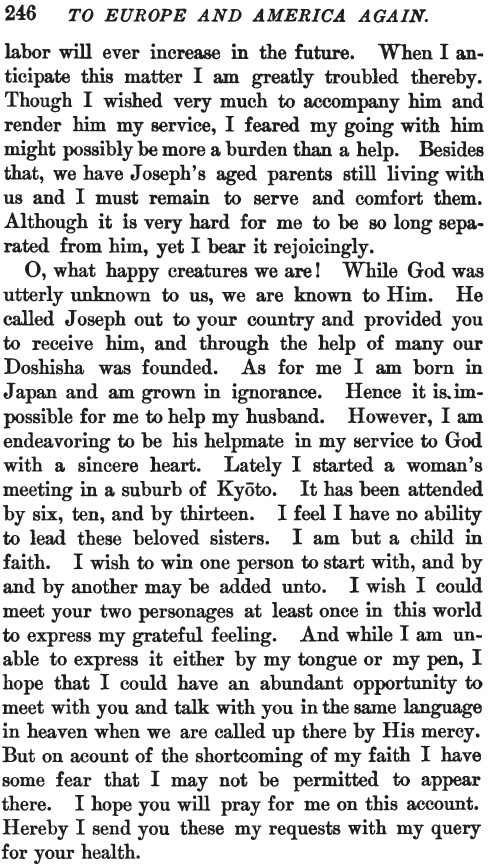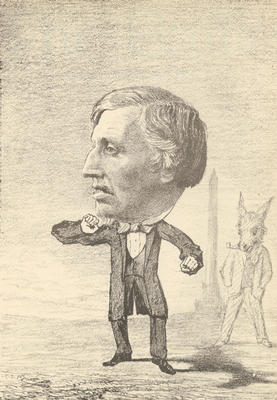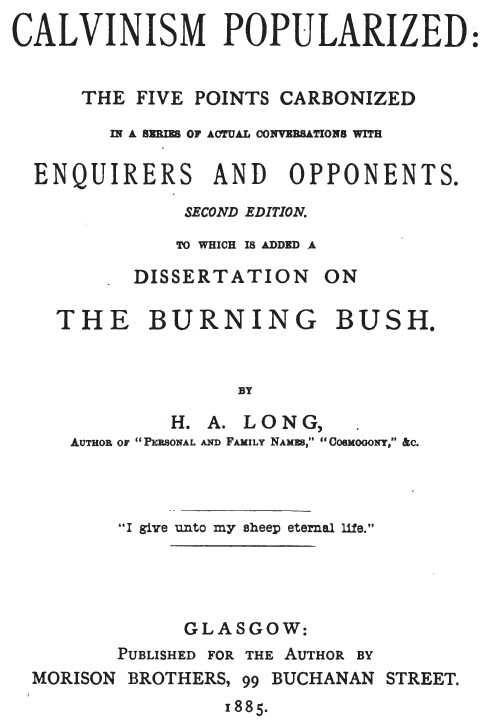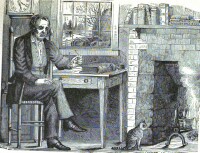 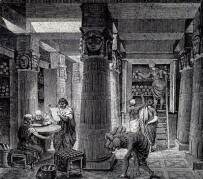 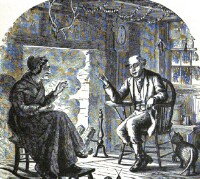 |
Archaebibliophilia
Occasional Postings of a Lover of Archaic Books
"a book... I have found" II Chron. 34:14,15
Occasional Postings of a Lover of Archaic Books
"a book... I have found" II Chron. 34:14,15
| <2016 | 2018> |
October 6, 2017
Spurgeon and Depression
In the last entry I included a page from Spurgeon's Lectures to My Students,
which is from Lecture XI entitled, "The Minister's Fainting Fits,"
meaning specifically, fits of depression. There are many, many other
quotes by Spurgeon which can be mentioned, the following being his
most-quoted, from The Treasury of
David, Expositions of Psalms 88 and 142:Ver. 3. For my soul is full of troubles... I
am satiated and nauseated
with them. Like a vessel full to the brim with vinegar, my heart is
filled up with adversity till it can hold no more. He had his house
full and his hands full of sorrow; but, worse than that, he had his
heart full of it. Trouble in the soul is the soul of trouble. A little
soul trouble is pitiful; what must it be to be sated with it? And how
much worse still to have your prayers return empty when your soul
remains full of grief.
And my life draweth nigh unto the grave... He felt as if he must die, indeed he thought himself half dead already. All his life was going, his spiritual life declined, his mental life decayed, his bodily life flickered; he was nearer dead than alive. Some of us can enter into this experience, for many a time have we traversed this valley of death shade, aye and dwelt in it by the month together. Really to die and be with Christ will be a gala day's enjoyment compared with our misery when a worse than physical death has cast its dreadful shadow over us.
Death would be welcomed as a relief by those whose depressed spirits make their existence a living death. Are good men ever permitted to suffer thus? Indeed they are; and some of them are even all their life time subject to bondage. O Lord, Be pleased to set free thy prisoners of hope! Let, none of thy mourners imagine that a strange thing has happened unto him, but rather rejoice as he sees the footprints of brethren who have trodden this desert before.
Ver. 5. Free among the dead... Unbound from all that links a man with life, familiar with death's door, a freeman of the city of the sepulchre, I seem no more one of earth's drudges, but begin to anticipate the rest of the tomb. It is a sad case when our only hope lies in the direction of death, our only liberty of spirit amid the congenial horrors of corruption.
Like the slain that lie in the grave, whom you remember no more... He felt as if he were as utterly forgotten as those whose carcasses are left to rot on the battle field. As when a soldier, mortally wounded, bleeds unheeded amid the heaps of slain, and remains to his last expiring groan unpitied and unsuccoured, so did Heman sigh out his soul in loneliest sorrow, feeling as if even God himself had quite forgotten him. How low the spirits of good and brave men will sometimes sink. Under the influence of certain disorders everything will wear a sombre aspect, and the heart will dive into the profoundest deeps of misery. It is all very well for those who are in robust health and full of spirits to blame those whose lives are sicklied over with the pale cast of melancholy, but the evil is as real as a gaping wound, and all the more hard to bear because it lies so much in the region of the soul that to the inexperienced it appears to be a mere matter of fancy and diseased imagination. Reader, never ridicule the nervous and hypochondriacal, their pain is real; though much of the evil lies in the imagination, it is not imaginary.
Ver. 6. Thou hast laid me in the lowest pit, in darkness, in the deeps... What a collection of forcible metaphors, each one expressive of the utmost grief. Heman compared his forlorn condition to an imprisonment in a subterranean dungeon, to confinement in the realms of the dead, and to a plunge into the abyss. None of the similes are strained. The mind can descend far lower than the body, for it there are bottomless pits. The flesh can bear only a certain number of wounds and no more, but the soul can bleed in ten thousand ways, and die over and over again each hour.
It is grievous to the good man to see the Lord whom he loves laying him in the sepulchre of despondency; piling nightshade upon him, putting out all his candles, and heaping over him solid masses of sorrow; evil from so good a hand seems evil indeed, and yet if faith could but be allowed to speak she would remind the depressed spirit that it is better to fall into the hand of the Lord than into the hands of man, and moreover she would tell the despondent heart that God never placed a Joseph in a pit without drawing him up again to fill a throne; that he never caused a horror of great darkness to fall upon an Abraham without revealing his covenant to him; and never cast even a Jonah into the deeps without preparing the means to land him safely on dry land.
Alas, when under deep depression the mind forgets all this, and is only conscious of its unutterable misery; the man sees the lion but not the honey in its carcass, he feels the thorns but he cannot smell the roses which adorn them. He who now feebly expounds these words knows within himself more than he would care or dare to tell of the abysses of inward anguish. He has sailed round the Cape of Storms, and has drifted along by the dreary headlands of despair. He has groaned out with one of old—"My bones are pierced in me in the night season; and my sinews take no rest. I go morning without the sun. Terrors are turned upon me, they pursue my soul as the wind."
Those who know this bitterness by experience will sympathise, but from others it would be idle to expect pity, nor would their pity be worth the having if it could be obtained. It is an unspeakable consolation that our Lord Jesus knows this experience, right well, having, with the exception of the sin of it, felt it all and more than all in Gethsemane when he was exceeding sorrowful even unto death.
Ps. 142:3
When my spirit was overwhelmed within me, then thou knewest my path... The bravest spirit is sometimes sorely put to it. A heavy fog settles down upon the mind, and the man seems drowned and smothered in it; covered with a cloud, crushed with a load, confused with difficulties, conquered by impossibilities. David was a hero, and yet his spirit sank: he could smite a giant down, but he could not keep himself up. He did not know his own path, nor feel able to bear his own burden. Observe his comfort: he looked away from his own condition to the ever observant, all knowing God: and solaced himself with the fact that all was known to his heavenly Friend. Truly it is well for us to know that God knows what we do not know. We lose our heads, but God never closes his eyes: our judgments lose their balance, but the eternal mind is always clear.
And my life draweth nigh unto the grave... He felt as if he must die, indeed he thought himself half dead already. All his life was going, his spiritual life declined, his mental life decayed, his bodily life flickered; he was nearer dead than alive. Some of us can enter into this experience, for many a time have we traversed this valley of death shade, aye and dwelt in it by the month together. Really to die and be with Christ will be a gala day's enjoyment compared with our misery when a worse than physical death has cast its dreadful shadow over us.
Death would be welcomed as a relief by those whose depressed spirits make their existence a living death. Are good men ever permitted to suffer thus? Indeed they are; and some of them are even all their life time subject to bondage. O Lord, Be pleased to set free thy prisoners of hope! Let, none of thy mourners imagine that a strange thing has happened unto him, but rather rejoice as he sees the footprints of brethren who have trodden this desert before.
Ver. 5. Free among the dead... Unbound from all that links a man with life, familiar with death's door, a freeman of the city of the sepulchre, I seem no more one of earth's drudges, but begin to anticipate the rest of the tomb. It is a sad case when our only hope lies in the direction of death, our only liberty of spirit amid the congenial horrors of corruption.
Like the slain that lie in the grave, whom you remember no more... He felt as if he were as utterly forgotten as those whose carcasses are left to rot on the battle field. As when a soldier, mortally wounded, bleeds unheeded amid the heaps of slain, and remains to his last expiring groan unpitied and unsuccoured, so did Heman sigh out his soul in loneliest sorrow, feeling as if even God himself had quite forgotten him. How low the spirits of good and brave men will sometimes sink. Under the influence of certain disorders everything will wear a sombre aspect, and the heart will dive into the profoundest deeps of misery. It is all very well for those who are in robust health and full of spirits to blame those whose lives are sicklied over with the pale cast of melancholy, but the evil is as real as a gaping wound, and all the more hard to bear because it lies so much in the region of the soul that to the inexperienced it appears to be a mere matter of fancy and diseased imagination. Reader, never ridicule the nervous and hypochondriacal, their pain is real; though much of the evil lies in the imagination, it is not imaginary.
Ver. 6. Thou hast laid me in the lowest pit, in darkness, in the deeps... What a collection of forcible metaphors, each one expressive of the utmost grief. Heman compared his forlorn condition to an imprisonment in a subterranean dungeon, to confinement in the realms of the dead, and to a plunge into the abyss. None of the similes are strained. The mind can descend far lower than the body, for it there are bottomless pits. The flesh can bear only a certain number of wounds and no more, but the soul can bleed in ten thousand ways, and die over and over again each hour.
It is grievous to the good man to see the Lord whom he loves laying him in the sepulchre of despondency; piling nightshade upon him, putting out all his candles, and heaping over him solid masses of sorrow; evil from so good a hand seems evil indeed, and yet if faith could but be allowed to speak she would remind the depressed spirit that it is better to fall into the hand of the Lord than into the hands of man, and moreover she would tell the despondent heart that God never placed a Joseph in a pit without drawing him up again to fill a throne; that he never caused a horror of great darkness to fall upon an Abraham without revealing his covenant to him; and never cast even a Jonah into the deeps without preparing the means to land him safely on dry land.
Alas, when under deep depression the mind forgets all this, and is only conscious of its unutterable misery; the man sees the lion but not the honey in its carcass, he feels the thorns but he cannot smell the roses which adorn them. He who now feebly expounds these words knows within himself more than he would care or dare to tell of the abysses of inward anguish. He has sailed round the Cape of Storms, and has drifted along by the dreary headlands of despair. He has groaned out with one of old—"My bones are pierced in me in the night season; and my sinews take no rest. I go morning without the sun. Terrors are turned upon me, they pursue my soul as the wind."
Those who know this bitterness by experience will sympathise, but from others it would be idle to expect pity, nor would their pity be worth the having if it could be obtained. It is an unspeakable consolation that our Lord Jesus knows this experience, right well, having, with the exception of the sin of it, felt it all and more than all in Gethsemane when he was exceeding sorrowful even unto death.
Ps. 142:3
When my spirit was overwhelmed within me, then thou knewest my path... The bravest spirit is sometimes sorely put to it. A heavy fog settles down upon the mind, and the man seems drowned and smothered in it; covered with a cloud, crushed with a load, confused with difficulties, conquered by impossibilities. David was a hero, and yet his spirit sank: he could smite a giant down, but he could not keep himself up. He did not know his own path, nor feel able to bear his own burden. Observe his comfort: he looked away from his own condition to the ever observant, all knowing God: and solaced himself with the fact that all was known to his heavenly Friend. Truly it is well for us to know that God knows what we do not know. We lose our heads, but God never closes his eyes: our judgments lose their balance, but the eternal mind is always clear.
Here are additional messages which Spurgeon preached on the topic:
Comfort for the
Desponding (Nov. 25, 1855)
Comfort in Trouble (April 7, 1858)
The Lifting Up of the Bowed Down (July 14, 1878)
To the Saddest of the Sad (June 3, 1888)
Cheer for Despondency (pub. Feb. 3, 1910)
Comfort in Trouble (April 7, 1858)
The Lifting Up of the Bowed Down (July 14, 1878)
To the Saddest of the Sad (June 3, 1888)
Cheer for Despondency (pub. Feb. 3, 1910)
From The Lost Sermons of Spurgeon: An Interview with Christian George:
What
is one thing about Spurgeon’s life and ministry that you think people
overlook?
I think it can be easy to make a
superhero out of Charles Spurgeon. In many ways, he does appear
bulletproof. If progress was the Victorian’s greatest virtue, Spurgeon
was as virtuous as they came. In his early twenties, he had become
pastor of the largest Protestant congregation in the world. His voice
reached crowds of three thousand and twenty-three thousand. His church
had baptized almost 15,000 members, maintained a weekly attendance of
6,000 people, and spawned 66 parachurch ministries, including two
orphanages, a book fund, a retirement home, and a theological college.
Every week, Spurgeon wrote nearly 500 letters, digested six meaty
books, preached up to 10 times, and constantly switched hats among
pastor, president, editor, author, and evangelist. By 1892, Spurgeon
had published more words in the English language than any other
Christian in history. Without the aid of television, radio, or the
Internet, Spurgeon proclaimed the gospel of Jesus Christ to an
estimated 10 million people in his lifetime. It is small wonder that,
according to Carl F. H. Henry, Charles Spurgeon is "one of evangelical
Christianity’s immortals."
But Spurgeon also bled like the rest of us. His mortality was always on his mind. Spurgeon suffered long periods of physical and mental illness. One psychiatrist has noted that if he lived today, Spurgeon would be diagnosed with bipolar disorder and treated with medicine. He was constantly plagued by disease on the one hand and depression on the other, always oscillating between gout and doubt. At the age of twenty-two, Spurgeon almost quit the ministry. Eight years later, his wife, Susannah, suffered a botched surgery that rendered her infertile for the rest of her life. At the end of his life, many of Spurgeon’s students, deacons, and even his own brother turned their backs on him.
Spurgeon was no stranger to suffering, and I think this is what made him connect so directly to his audience. He appealed to the common working class because he suffered as one of them. He could incarnate the gospel because he himself was human. Spurgeon once said, "If there is anything in this world for which I would bless [God] more than for anything else, it is for pain and affliction. … Fear not the storm. It brings healing in its wings, and when Jesus is with you in the vessel, the tempest only hastens the ship to its desired haven."
Spurgeon is often subject to hero-worship. But I hope this publication will break from the usual hagiography which deteriorates Spurgeon scholarship, and instead paint a three-dimensional portrait of the preacher whose warts reveal as much about his profile as his dimples.
But Spurgeon also bled like the rest of us. His mortality was always on his mind. Spurgeon suffered long periods of physical and mental illness. One psychiatrist has noted that if he lived today, Spurgeon would be diagnosed with bipolar disorder and treated with medicine. He was constantly plagued by disease on the one hand and depression on the other, always oscillating between gout and doubt. At the age of twenty-two, Spurgeon almost quit the ministry. Eight years later, his wife, Susannah, suffered a botched surgery that rendered her infertile for the rest of her life. At the end of his life, many of Spurgeon’s students, deacons, and even his own brother turned their backs on him.
Spurgeon was no stranger to suffering, and I think this is what made him connect so directly to his audience. He appealed to the common working class because he suffered as one of them. He could incarnate the gospel because he himself was human. Spurgeon once said, "If there is anything in this world for which I would bless [God] more than for anything else, it is for pain and affliction. … Fear not the storm. It brings healing in its wings, and when Jesus is with you in the vessel, the tempest only hastens the ship to its desired haven."
Spurgeon is often subject to hero-worship. But I hope this publication will break from the usual hagiography which deteriorates Spurgeon scholarship, and instead paint a three-dimensional portrait of the preacher whose warts reveal as much about his profile as his dimples.
October 4, 2017
The Apocrypha read and valued by
Luther, Bunyan, Spurgeon
Most Christians probably have never read the Apocrypha, the 14 or so
books that did not make up the accepted canon for the Holy Bible,
though many of the original Bible versions incorporated the Apocryphy
between the Old and New Testaments, e.g. the Geneva, Coverdale, King
James versions.Luther's German version included the Apocrypha, though in a separate section. I found this re Luther's Preface to the Book of Jesus Sirach (1533):
This book has heretofore carried
the Latin title, Ecclesiasticus,
which has been understood in German to mean "spiritual discipline."
Through reading, singing, and preaching it has been extensively used
and inculcated in the churches, yet with little understanding or profit
except to exalt the estate of the clergy and the pomp of the churches.
Its real name is otherwise Jesus Sirach, after its author as its own prologue and the Greek [50:27] indicate. This is how the books of Moses, Joshua, Isaiah, and all the prophets are named, after their authors. Yet the ancient fathers did not include this one among the books of sacred Scripture, but simply regarded it as the fine work of a wise man. And we shall let it go at that...
This is a useful book for the ordinary man. The author concentrates all his effort on helping a citizen or housefather to be Godfearing, devout, and wise; and on showing what the relationship of such a man should be to God, the Word of God, priests, parents, wife, children, his own body, his servants, possessions, neighbors, friends, enemies, government, and anyone else. So one might well call this a book on home discipline or on the virtues of a pious householder. This indeed is the proper "spiritual discipline," and should be recognized as such.
Should anyone like to know what labor it cost us to translate this book, let him compare our German with all the other versions, be they Greek, Latin, or German, old or new—the product will bear sufficient testimony concerning those who produced it. In all languages so many wiseacres have gone at this book that—quite apart from its inherent lack of order from the very outset—one should not be surprised if it turned out completely unrecognizable, unintelligible, and in every respect worthless. But we have put it together again like a torn, trampled, and scattered letter, and washed off the mud; we have brought it into shape as anyone can see for himself. God be praised and thanked. Amen. Christians will not criticize us for this, but the world will; in keeping with its virtues, it will manage to thank us as it has always done. [LW 35:347-348]
Its real name is otherwise Jesus Sirach, after its author as its own prologue and the Greek [50:27] indicate. This is how the books of Moses, Joshua, Isaiah, and all the prophets are named, after their authors. Yet the ancient fathers did not include this one among the books of sacred Scripture, but simply regarded it as the fine work of a wise man. And we shall let it go at that...
This is a useful book for the ordinary man. The author concentrates all his effort on helping a citizen or housefather to be Godfearing, devout, and wise; and on showing what the relationship of such a man should be to God, the Word of God, priests, parents, wife, children, his own body, his servants, possessions, neighbors, friends, enemies, government, and anyone else. So one might well call this a book on home discipline or on the virtues of a pious householder. This indeed is the proper "spiritual discipline," and should be recognized as such.
Should anyone like to know what labor it cost us to translate this book, let him compare our German with all the other versions, be they Greek, Latin, or German, old or new—the product will bear sufficient testimony concerning those who produced it. In all languages so many wiseacres have gone at this book that—quite apart from its inherent lack of order from the very outset—one should not be surprised if it turned out completely unrecognizable, unintelligible, and in every respect worthless. But we have put it together again like a torn, trampled, and scattered letter, and washed off the mud; we have brought it into shape as anyone can see for himself. God be praised and thanked. Amen. Christians will not criticize us for this, but the world will; in keeping with its virtues, it will manage to thank us as it has always done. [LW 35:347-348]
The book Ecclesiasticus has been of great benefit to other godly authors. Here's what Bunyan wrote in his Grace Abounding to the Chief of Sinners:
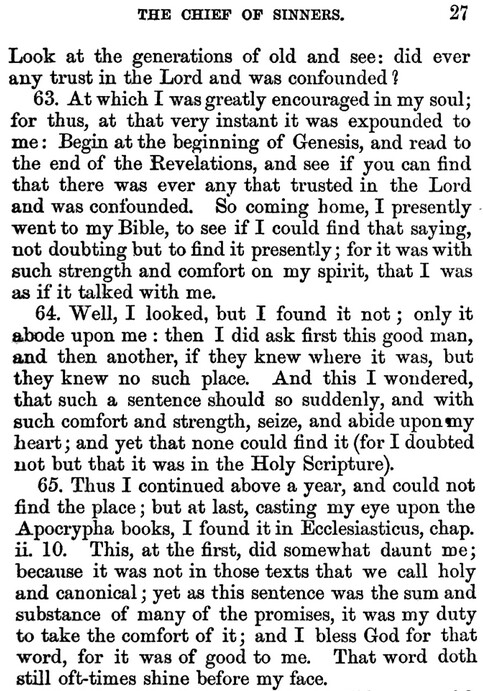
Spurgeon also read that book of The Wisdom of Jesus the Son of Sirach. Here's from his Lectures to My Students:
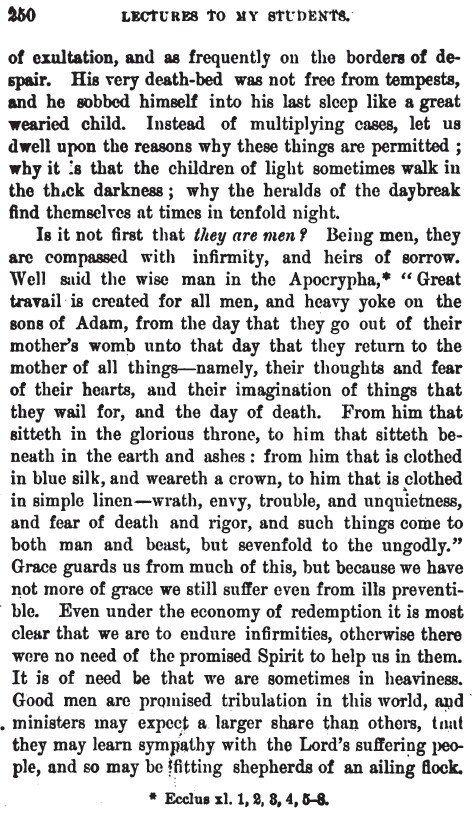
August 25, 2017
American Indians against Americans
I thought this was worth repeating, from Federer's American Minute. The natives in early America were often used to help fight wars among the various nations vying for colonial domination. It is no wonder there was so much animosity held by all parties involved.
British Admiral Horatio Nelson defeated Napoleon's
combined French and Spanish fleet at the Battle of
Trafalgar, October 21, 1805.
On reason for the victory was the speed of the British ships, aided by their hulls being caulked with tar from Pitch Lake on the Island of Trinidad. The world's largest natural asphalt lake, it was first discovered by Sir Walter Raleigh in 1595 in his search for El Dorado - the City of Gold.
Britain now had the undisputed most powerful navy in the world.
Britain began to intercept American ships headed to French ports.
They seized their goods and impressed thousands of American sailors into the British navy.
The British Government, as during the Revolutionary War, again supplied weapons to Indians and incited them to terrorize and attack American frontier settlements.
In alliance with the British, Shawnee Chief Tecumseh approached many tribes across a thousand mile frontier in an attempt to form a confederation.
In the Shawnee language, the name 'Tecumseh' means 'shooting star.'
The appearance of the Great Comet of 1811, which reached its brightest in October.
This was followed by the New Madrid Earthquakes, December 16, 1811 to February 7, 1812, which could be felt hundreds of miles away, and even temporarily reversed the flow of the Mississippi River.
The fear associated with these events contributed to Tecumseh raising nearly 5,000 warriors under his direction.
Some were Shawnee, who had been forced from the east and resettled in northwestern Ohio and Northeastern Indiana; and Lenape who had resettled in south-central Indiana.
Others were from:
Miami in central Indiana;
Pottawatomie in northern Indiana and Michigan;
Wea, Kickapoo and Piankeshaw in western Indiana and eastern Illinois;
Sauk in northern Illinois;
Iroquois in Canada;
Chickamauga; Ojibway; Mascouten; Wyandot; Fox; Winnebago; Ottowa; Mingo; Seneca; and Red Stick Creek in Alabama.
On July 17, 1812 British and Native American tribes captured Fort Mackinac.
On August 15, 1812, Pottawatomie attacked Fort Dearborn, massacring 38 American soldiers, 2 women, 12 children, and took 41 prisoners.
The British with Native American allies threatened or captured American forts:
Fort Osage,
Fort Madison;
Fort Shelby;
Rock Island Rapids;
Credit Island;
Fort Johnson;
Fort Cap au Gris and
Battle of the Sink Hole.
700 British regulars and Canadian militia joined Tecumseh's warriors in the capture of Fort Detroit, forcing 2,500 Americans to surrender August 16, 1812.
With a rumor British would pay in gold for American scalps, over 500 Americans were massacred by the Red Stick Creeks in Fort Mims, Alabama, August 30, 1813.
In September of 1813, with war hindering supply lines to British Fort Malden in Amherstburg, Ontario, the British attempted to send supplies on a squadron of six ships across Lake Erie, commanded by the one-armed Commodore Robert Barclay who had his arm blown off fighting Napoleon's French fleet.
The United States had 28-year-old Captain Oliver Hazard Perry launch ships into Lake Eire at Put-in-Bay, Ohio, to block the British.
Most of Perry's crew were free Blacks from Ohio.
Built in shipyards along the Erie Canal, Perry's ships, called the Fleet of the Wilderness, were caulked with lead.
September 9, 1813, was recommended by President James Madison as a day of Public Humiliation and Prayer:
The next day, September 10, 1813, Captain Oliver Hazard Perry confronted the British squadron.
Strong winds prevented Perry from getting into a safe position.
Long-range British cannons splintered to pieces Perry's flagship, the USS Lawrence, killing many of his crew.
Faithful to his battle flag, "DON'T GIVE UP THE SHIP," Perry and his men courageously rowed a half mile through heavy gunfire to the USS Niagara.
The wind suddenly changed directions and Perry sailed broadside directly across the British line, firing every cannon continuously.
After 15 minutes, the smoke cleared to reveal that all of Barclay's ships had been disabled.
This was the first time in history that an entire British naval squadron had been disabled at one time.
To the sailors on deck Captain Perry remarked: "The prayers of my wife are answered."
That same day, Captain Oliver Hazard Perry sent a dispatch to U.S. Major General William Henry Harrison: "Dear Gen'l, WE HAVE MET THE ENEMY, AND THEY ARE OURS, two ships, two brigs, one schooner and one sloop. Yours with great respect and esteem. H. Perry."
Captain Oliver Hazard Perry wrote to the Secretary of the Navy: "It has pleased the Almighty to give the arms of the United States a signal victory over their enemies on this lake. The British squadron, consisting of two ships, two brigs, one schooner, and one sloop have this moment surrendered to the force of my command after a sharp conflict."
President James Madison stated in his 5th Annual Message, December 7, 1813: "It has pleased the Almighty to bless our arms ... On Lake Erie, the squadron under the command of Captain Perry having met the British squadron of superior force, a sanguinary conflict ended in the capture of the whole."
As a result of Perry's victory, the British abandoned Fort Malden.
Major General William Henry Harrison was then able to recapture Fort Detroit and defeat the British and their Indian ally Shawnee Chief Tecumseh at the Battle of the Thames, October 5, 1813.
Captain Oliver Hazard Perry died AUGUST 23, 1819, being hailed as a national hero for victorious role in the War of 1812 and helping to secure for the United States the Northwest Territory.
On reason for the victory was the speed of the British ships, aided by their hulls being caulked with tar from Pitch Lake on the Island of Trinidad. The world's largest natural asphalt lake, it was first discovered by Sir Walter Raleigh in 1595 in his search for El Dorado - the City of Gold.
Britain now had the undisputed most powerful navy in the world.
Britain began to intercept American ships headed to French ports.
They seized their goods and impressed thousands of American sailors into the British navy.
The British Government, as during the Revolutionary War, again supplied weapons to Indians and incited them to terrorize and attack American frontier settlements.
In alliance with the British, Shawnee Chief Tecumseh approached many tribes across a thousand mile frontier in an attempt to form a confederation.
In the Shawnee language, the name 'Tecumseh' means 'shooting star.'
The appearance of the Great Comet of 1811, which reached its brightest in October.
This was followed by the New Madrid Earthquakes, December 16, 1811 to February 7, 1812, which could be felt hundreds of miles away, and even temporarily reversed the flow of the Mississippi River.
The fear associated with these events contributed to Tecumseh raising nearly 5,000 warriors under his direction.
Some were Shawnee, who had been forced from the east and resettled in northwestern Ohio and Northeastern Indiana; and Lenape who had resettled in south-central Indiana.
Others were from:
Miami in central Indiana;
Pottawatomie in northern Indiana and Michigan;
Wea, Kickapoo and Piankeshaw in western Indiana and eastern Illinois;
Sauk in northern Illinois;
Iroquois in Canada;
Chickamauga; Ojibway; Mascouten; Wyandot; Fox; Winnebago; Ottowa; Mingo; Seneca; and Red Stick Creek in Alabama.
On July 17, 1812 British and Native American tribes captured Fort Mackinac.
On August 15, 1812, Pottawatomie attacked Fort Dearborn, massacring 38 American soldiers, 2 women, 12 children, and took 41 prisoners.
The British with Native American allies threatened or captured American forts:
Fort Osage,
Fort Madison;
Fort Shelby;
Rock Island Rapids;
Credit Island;
Fort Johnson;
Fort Cap au Gris and
Battle of the Sink Hole.
700 British regulars and Canadian militia joined Tecumseh's warriors in the capture of Fort Detroit, forcing 2,500 Americans to surrender August 16, 1812.
With a rumor British would pay in gold for American scalps, over 500 Americans were massacred by the Red Stick Creeks in Fort Mims, Alabama, August 30, 1813.
In September of 1813, with war hindering supply lines to British Fort Malden in Amherstburg, Ontario, the British attempted to send supplies on a squadron of six ships across Lake Erie, commanded by the one-armed Commodore Robert Barclay who had his arm blown off fighting Napoleon's French fleet.
The United States had 28-year-old Captain Oliver Hazard Perry launch ships into Lake Eire at Put-in-Bay, Ohio, to block the British.
Most of Perry's crew were free Blacks from Ohio.
Built in shipyards along the Erie Canal, Perry's ships, called the Fleet of the Wilderness, were caulked with lead.
September 9, 1813, was recommended by President James Madison as a day of Public Humiliation and Prayer:
"Whereas in times of public
calamity such as that of the war brought on the United States by the
injustice of a foreign government it is especially becoming that the
hearts of all should be touched with the same and the eyes of all be
turned to that Almighty Power in whose hand are the welfare and the
destiny of nations:
I do therefore ... recommending to all who shall be piously disposed to unite their hearts and voices in addressing at one and the same time their vows and adorations to the Great Parent and Sovereign of the Universe that they assemble on the SECOND THURSDAY OF SEPTEMBER next in their respective religious congregations ..."
"He has blessed the United States with a political Constitution rounded on the will and authority of the whole people and guaranteeing to each individual security, not only of his person and his property, but of those sacred rights of conscience so essential to his present happiness and so dear to his future hopes ...
with ... supplications to the same Almighty Power that He would look down with compassion on our infirmities;
that He would pardon our manifold transgressions and awaken and strengthen in all the wholesome purposes of repentance and amendment;
that in this season of trial and calamity He would ... inspire all citizens with a love of their country ...
that as He was graciously pleased heretofore to smile on our struggles against the attempts of the Government of the (British) Empire ...
so He would now be pleased ... to bestow His blessing on our arms in resisting the hostile and persevering efforts of the same power to degrade us on the ocean."
I do therefore ... recommending to all who shall be piously disposed to unite their hearts and voices in addressing at one and the same time their vows and adorations to the Great Parent and Sovereign of the Universe that they assemble on the SECOND THURSDAY OF SEPTEMBER next in their respective religious congregations ..."
"He has blessed the United States with a political Constitution rounded on the will and authority of the whole people and guaranteeing to each individual security, not only of his person and his property, but of those sacred rights of conscience so essential to his present happiness and so dear to his future hopes ...
with ... supplications to the same Almighty Power that He would look down with compassion on our infirmities;
that He would pardon our manifold transgressions and awaken and strengthen in all the wholesome purposes of repentance and amendment;
that in this season of trial and calamity He would ... inspire all citizens with a love of their country ...
that as He was graciously pleased heretofore to smile on our struggles against the attempts of the Government of the (British) Empire ...
so He would now be pleased ... to bestow His blessing on our arms in resisting the hostile and persevering efforts of the same power to degrade us on the ocean."
The next day, September 10, 1813, Captain Oliver Hazard Perry confronted the British squadron.
Strong winds prevented Perry from getting into a safe position.
Long-range British cannons splintered to pieces Perry's flagship, the USS Lawrence, killing many of his crew.
Faithful to his battle flag, "DON'T GIVE UP THE SHIP," Perry and his men courageously rowed a half mile through heavy gunfire to the USS Niagara.
The wind suddenly changed directions and Perry sailed broadside directly across the British line, firing every cannon continuously.
After 15 minutes, the smoke cleared to reveal that all of Barclay's ships had been disabled.
This was the first time in history that an entire British naval squadron had been disabled at one time.
To the sailors on deck Captain Perry remarked: "The prayers of my wife are answered."
That same day, Captain Oliver Hazard Perry sent a dispatch to U.S. Major General William Henry Harrison: "Dear Gen'l, WE HAVE MET THE ENEMY, AND THEY ARE OURS, two ships, two brigs, one schooner and one sloop. Yours with great respect and esteem. H. Perry."
Captain Oliver Hazard Perry wrote to the Secretary of the Navy: "It has pleased the Almighty to give the arms of the United States a signal victory over their enemies on this lake. The British squadron, consisting of two ships, two brigs, one schooner, and one sloop have this moment surrendered to the force of my command after a sharp conflict."
President James Madison stated in his 5th Annual Message, December 7, 1813: "It has pleased the Almighty to bless our arms ... On Lake Erie, the squadron under the command of Captain Perry having met the British squadron of superior force, a sanguinary conflict ended in the capture of the whole."
As a result of Perry's victory, the British abandoned Fort Malden.
Major General William Henry Harrison was then able to recapture Fort Detroit and defeat the British and their Indian ally Shawnee Chief Tecumseh at the Battle of the Thames, October 5, 1813.
Captain Oliver Hazard Perry died AUGUST 23, 1819, being hailed as a national hero for victorious role in the War of 1812 and helping to secure for the United States the Northwest Territory.
June 14, 2017
He will not undo the creation of His grace
One of the best from Spurgeon's Cheque Book of the Bank of Faith: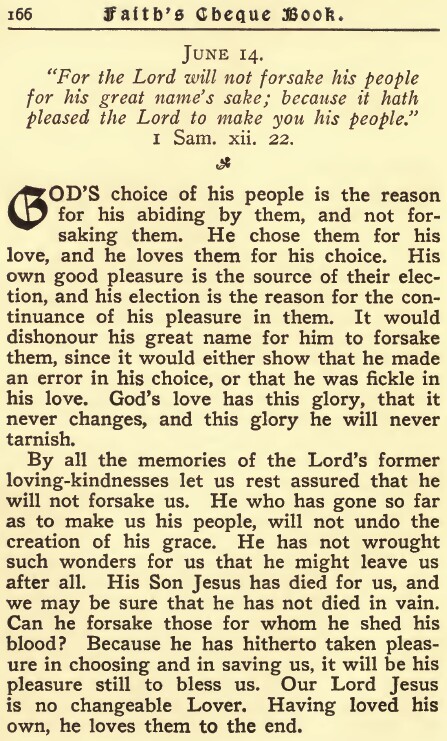
Here's a little background on that blessed little book, from Spurgeon's autobiography:
The volume which, more than any
other of Mr. Spurgeon's writings, illustrates his power of rapid
composition, is The
Cheque Book of the Bank of Faith.
It consists of 366 Scripture promises, arranged for daily use, with
brief experimental comments suitable for reading at family worship or
as a help to private devotion.
During the Pastor's stay at Mentone, in the winter of 1887-8, there was one Monday when the rain poured down incessantly in such tropical fashion that he was compelled to remain indoors all day. His companions were not aware that he was contemplating the commencement of another new book, but they noticed how rapidly he was covering sheet after sheet of foreign notepaper.
After a while, he explained that he had begun a volume of daily meditations; and, before he went to bed, that night, he had finished the portions for the month of January, and handed them to Mr. Passmore to send off to London for the printers. They were so carefully written that they needed but little correction; and anyone who has the book, and examines the first thirty-one pages in it, will be able to estimate both the quantity and the quality of one wet day's work while the Pastor was supposed to be on his holiday in the sunny South.
During the Pastor's stay at Mentone, in the winter of 1887-8, there was one Monday when the rain poured down incessantly in such tropical fashion that he was compelled to remain indoors all day. His companions were not aware that he was contemplating the commencement of another new book, but they noticed how rapidly he was covering sheet after sheet of foreign notepaper.
After a while, he explained that he had begun a volume of daily meditations; and, before he went to bed, that night, he had finished the portions for the month of January, and handed them to Mr. Passmore to send off to London for the printers. They were so carefully written that they needed but little correction; and anyone who has the book, and examines the first thirty-one pages in it, will be able to estimate both the quantity and the quality of one wet day's work while the Pastor was supposed to be on his holiday in the sunny South.
June 7, 2017
"Biblical techniques" in anime
From an article about the hit anime flick in Japan, Your Name:In the interview, Kawamura goes
on to explain that "Mitsuha is a Shinto shrine maiden, and she makes
kuchikamizake [a traditional sake made by shrine maidens chewing and
spitting out rice]. So I thought that depicting
her as a sort of Virgin Mary-like person would be better. That’s
a technique that’s been around
since the days of the Bible, and Hayao Miyazaki did the same
thing. Nausicaa and Sheeta aren’t into any other guys [when their
stories begin]."
The combination of "being like the Virgin Mary" and "not having a guy she’s into when she first appears in the narrative" is a bit of a contradiction, seeing as how Jesus’ mom is already married to Joseph when she shows up in the Bible. The heroines of Miyazaki’s Nausicaa of the Valley of the Wind and Castle in the Sky Laputa, though, are completely without romantic aspirations at the start of the movies in which they take center stage (although both enter into adventuring partnerships with male characters they meet as the story unfolds).
The combination of "being like the Virgin Mary" and "not having a guy she’s into when she first appears in the narrative" is a bit of a contradiction, seeing as how Jesus’ mom is already married to Joseph when she shows up in the Bible. The heroines of Miyazaki’s Nausicaa of the Valley of the Wind and Castle in the Sky Laputa, though, are completely without romantic aspirations at the start of the movies in which they take center stage (although both enter into adventuring partnerships with male characters they meet as the story unfolds).
May 29, 2017
The Five Points "Carbonized"
From the Glasgow Story:Harry Alfred Long was a missionary and an anti-Catholic orator. Originally from Cambridge, Long came to Glasgow to work at St Jude’s Episcopal Church. He became a missionary with the Working Men’s Evangelical Society, helping to feed, clothe and find beds for the unemployed in the Bridgeton area.I was intrigued by the title of one of Long's books, Calvinism Popularized: The Five Points Carbonized (1885). By "carbonized" Long probably had in mind one result of carbonization, i.e. a diamond. Here are some excerpts from the Dedicatory Letter and Preface:
Long was a committed Orangeman and an active supporter of the Conservative Party. A fiery orator, he drew large crowds on Glasgow Green to hear him "railing at the Pope and the Devil," and he was a prolific writer of polemical tracts, leaflets and books. His attitude to Roman Catholicism is illustrated by a statement attributed to him: "I... could not shake hands with the Pope; I could only punch his head."
Long’s views brought him into frequent conflict with the liberal churchman, John Page Hopps, with whom he sat on the Glasgow School Board.
...Can my reader be surprised I became Calvinistic? I wondered with anger that I had deprived myself of so great joy of so long a time, but discovered that Elohim is always revealed to the soul before Jehovah, that God is known in His dreadful power before the Lord is in His gracious actings. I look back to that epoch as to a second regeneration, for I found it presenting the Almighty in a thousandfold more amiable aspect than my previously shallow and narrow theory of acceptance and works, yielding to a general amnesty offer, and then rendering partial obedience, not knowing when legal requirements were satisfied. I had sold my inheritance for nothing on this wise.
When first uniting myself to God's people I preferred the Arminian view because of its wider sweep of benevolence. Did it not give every one a chance? and ought not every one to have a chance of salvation? I did not see there can be no chance with God and that the word is only a veil for ignorance. That all ought to have a chance of salvation is as true of a world of rebels as that all convicts in Millbank ought to have a chance of escape. For criminals there is no hope in England except from the Queen through the Home Secretary, and so for sinners there is no hope in the world but God's mercy through Christ. Criminals have no rights towards her Majesty, sinners none in respect to God.
But the professed liberality of Arminianism had deluded me as though more would be saved on the broad gauge of Arminius than on the narrow gauge of Calvin. I find that the number of the redeemed at last is identical upon both systems, but, in verity, not a soul is saved on Arminian principles—salvation by works. Arminianism is fatal to salvation at all. The fact is, Christian Arminians are saved as all God's ransomed are, without consultation by Heaven or effort on their part or God's; but misreading the phenomena and feelings that accompany salvation they suppose they did something. Jesus makes it plain. "Philip findeth Nathanael, and saith unto him, We have found Jesus. . . . Jesus said unto Nathanael, Before that Philip called thee, when thou wast under the fig tree, I saw thee." This "I saw thee" is no less than Ezek. xvi. 6, " I passed by thee, and saw thee." He who is the life passed by Nathanael, and said, "Live," and then Nathanael shewed he was alive by saying, "Rabbi, Thou art the Son of God," but it is possible he might think he initiated arrangements. So our Lord says, (John xvi. 16,) "Ye have not chosen me, but I have chosen you." For our choice of Him is not choosing compared with His choice of us.
...The sons of Abraham being dispersed among the nations symbolize His spiritual seed being distributed according to the dualism of God's mysterious economy. They are scattered in unbelief and shadow believers, they will be gathered in unbelief, and so become the last sign the Bridegroom gives before the marriage supper of the Lamb. The destruction of Jerusalem prefigured that of the world, their ingathering ours. I have no ambition to impart these views to my brethren, compared with anxiety to emancipate them from Arminianism, and give them to see the fulness of the substitutionary work of our Saviour. I write in the hope of being instrumental in guiding some brother into that higher Christian life.
...I write as a patriot as well as a believer. Will our great empire crumble to decay as did that of Nebuchadnezzar, Darius, Alexander, Caesar? Britain has 50 colonies. Some of them superior in resources as to men and money, skill and acreage, to herself of 500 years ago. Will Britannia yet sit in the dust as shieldless as the captive daughter of Judah? as shipless as Tyre? as uncolonial as Italy? Never! Former civilizations decayed, for they were only material like the Assyrian, or material and mental like that of Greece, whereas our empire adds to the grandeur of matter and the splendour of mind, the more excelling glory of morality.
To us pertains the supreme honour of being civilizers, emancipators, educators. We take with us the steam-engine, and are followed by collegiate institutions. On our humanizing line of march slaves are transformed into freemen, and cannibals into citizens. Our very language is identified with freedom, elevation, purity. Thirty years since I was thrilled by hearing my Lord say to the church in Ephesus, "I will remove thy candlestick"—nine years ago I gazed with awe upon the Ephesian sculptures. He did not put out the candle, that is not His wont, but removed it to Britain. Nay, I sincerely believe and boldly affirm, that when Jesus threatened the Jews saying, "The kingdom of heaven shall be taken from you and given to a nation bringing forth the fruits of it," He meant ours. Observe, He did not say Gentiles,—i. e., all nations but one. As the latter prophets refused to recognise any political division of Abraham's sons into ten tribes and two, but always spoke of the twelve tribes of Israel, so we, in this matter, recognise no Atlantic, refuse to see our American brethren as anything else than one with us.
To Britannia and Fredonia one dispensation is committed—to supersede the savage by civilization, to irradiate the else dark by education, to display the Book, and spread widely the blood-stained banner of the Lamb. So doing, the star of our race shall not fade until the Day Star re-appear to Bethlehemize the whole earth with millennial glory. While our people bless Ethiopia with Livingstonias and Lovedales—feed the starving sons of Sinim, and say to the Japanese, "Behold your God!" One will watch over British interests, One will not suffer our flag to be trailed.
Holding that Calvinism energizes the profession of Christianity, I write to strengthen the hand of my countrymen.
--------------------
SCOTLAND, ecclesiastically considered, is still the Calvinistic country of Europe, in spite of inroads made by broads, neologists and spurious liberals in matters theological. Italian divines yet speak of Scotchmen as the Azurini, men who shook out on moors and braes the azure flag of the Covenant, signifying Christ is Head of Nations, not the pope. We feared that in these days when a man wins fame by aiming one blow at Mother Church, becomes the admired of thousands for safe boldness, some of its blue folds would be reefed, but, thanks to God, and joy to us, the churches of this Gospel-taught land still uphold the blue standard of the Lord in all its olden breadth. The sons of Scotia are still the Azurini, though some of their clergy are honey-combed with new forms of Arminianism, shading the glory of the Transfigured Man by building their tabernacles for Him instead of entering the temple which God built for them.
Protestantism branches off into Lutheranism and Calvinism. I prefer the latter for this among other reasons—it alone sanctifies the entire of the Sabbath. Unless the Lord's day be observed, religion wanes in a land. Hence spiritual life is almost unknown in the Lutheran lands, thus popular religion has ceased throughout Germany. Though ministers taught all truth, so long as the people observed no Sabbath progress in piety there would be little. Scotland, first in Calvinism, is on that very account first in Sabbatarianism.
March 15, 2017
Christ's Passion and Resurrection
I've mentioned Gossner's
daily meditations before, and here is a two-month excerpt from his work
on the sufferings of Christ, and His glorious resurrection -- words
which pierce the heart with conviction and cause us to see more vividly
Christ in His great love, mercy and grace. Spend a portion of your day
reading these, that you may with Paul exclaim, "That I may know him, and the power of his resurrection, and the fellowship of his sufferings,
being made conformable unto his death" (Phil. 3:10).February 23, 2017
Revival of Imperial Rescript in
Japan?!
From this article:https://www.japantoday.com/category/politics/view/abe-questioned-over-govt-land-deal-with-nationalist-school-operator
The kindergarten makes its pupils
memorize Japan’s Imperial Rescript on
Education -- an 1890 edict that was used to promote
emperor-oriented and militaristic education before and during World War
II.
And one of the comments:
I saw a short documentary last
year on the Moritomo Gakuen kindergarten and was appalled at the
display of regimented emperor worship spouted by little 4 & 5 year
olds that would not have been out of place in Pyongyang.
Seriously scary stuff and Abe's wife is to be honorary principal of the new school.
Seriously scary stuff and Abe's wife is to be honorary principal of the new school.
Though a bit fuzzy, here is the English version of the Rescript, one of the exhibits from the Tokyo war crimes trials held in 1946.
January 26, 2017
Japanese Christian - Joseph Hardy
Neesima
Pretty
well-known in Japan, Japanese name Niijima Jo (sea captain called him
Joe and the name stuck), but he was given the name Joseph Hardy Neesima
by his "adoptive parents" when he was in the US (as an illegal
immigrant since he was a stowaway). I guess he didn't like the kanji
for Shimeta, 七五三太, the kanji being from the Shichi-Go-San festival, but
actually means something like, "Yippee!"NHK made a drama series (Yae no Sakura) about his wife, Yae, which I haven't seen but probably Niijima's Christianity wasn't mentioned and how much he changed early Japan, kind of like Yoshida Shoin who was also the center of one of their drama series; Niijima's life is much more fascinating.
Here are some interesting excerpts (Life and Letters of Joseph Hardy Neesima by Arthur Hardy, 1894), from when he couldn't write English well, then later when he could. He bought a Chinese New Testament in Shanghai after arriving there, had to sell his short sword (he was samurai) to pay for it (his long sword paid for his trip to Shanghai). I don't know much about his theology, where he actually stood, but, sadly like so many colleges which started godly, Doshisha is now quite liberal.
Following also is a letter from Yae Niijima, who led a most interesting life.
